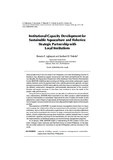Browsing Conference Proceedings by Author "Agbayani, Renato F."
Now showing items 1-11 of 11
-
Comparative strategies in community-based mangrove rehabilitation programs in the Philippines
Primavera, Jurgenne ; Agbayani, Renato F. (United Nations Educational Scientific and Cultural Organisation; Japanese Man and the Biosphere National Committee; Mangrove Ecosystem Research Centre, 1997)
Philippine Mangroves have decreased from around 500,000 ha at the turn of the century to 132,000 ha in 1990. Given the varied and important socioeconomic and ecological functions of mangroves including harvest of forestry ...
; Agbayani, Renato F. (United Nations Educational Scientific and Cultural Organisation; Japanese Man and the Biosphere National Committee; Mangrove Ecosystem Research Centre, 1997)
Philippine Mangroves have decreased from around 500,000 ha at the turn of the century to 132,000 ha in 1990. Given the varied and important socioeconomic and ecological functions of mangroves including harvest of forestry ... -
Economics of milkfish culture in the Philippines
Agbayani, Renato F. (Food and Agriculture Organization of the United Nations, South Pacific Aquaculture Development Project, 1990)This paper discusses the costs and returns of three phases in milkfish culture as practiced in the Philippines namely: nursery; stunting or retarding the growth of milkfish fingerlings; and modular culture system. The ... -
Institutional capacity development for sustainable aquaculture and fisheries: Strategic partnership with local institutions
Agbayani, Renato F.; Toledo, Joebert D. (Terrapub, 2008)Many people living in the rural areas in the Philippines, as in other developing countries in Southeast Asia, depend on aquatic resources for their food and livelihood. For the past two decades, the Aquaculture Department ... -
Philippines
Agbayani, Renato F.; Lim, Rogelio M. (Asian Productivity Organization, 1996) -
Pond culture of mud crab (Scylla serrata): an economic analysis.
Samonte, Giselle P.B.; Agbayani, Renato F. (1992)The study compares the profitability of mud crab pond culture with existing crab fattening practices in Iloilo, Philippines. Monoculture of Scylla serrata at stocking densities of 5,000, 10,000, 15,000 and 20,000 pcs/ha ... -
Problems encountered in the implementation of a community-based fishery resources management project
Agbayani, Renato F.; Siar, Susana V. (International Center for Living Aquatic Resources Management, 1994)The article highlights the SEAFDEC Aquaculture Department's (Philippines) Community-based Fishery Resource Management Project activities. Several problems encountered in project implementation and the suggested ways in ... -
Series: FAO fisheries and aquaculture proceedings; 31
Resiliency of small-holder fishfarmers to climate change and market prices in selected communities in the Philippines
A rapid assessment of the resiliency of small-holder fishfarmers in selected communities in the Philippines was conducted to gather the fishfarmers’ observations and insights about climate change and market prices, and the ... -
Review of social and economic research in the fishery sector of the Philippines: a country paper
Agbayani, Renato F.; Tarrosa-Pestano, Ma. Cecilia; Evangelista, Danilo C.; Sevilleja, Ruben L.; Lopez, Nelson A.; Pomeroy, Robert S. (Asian Fisheries Society, 1994)The problems confronting the fishery sector have received varying degree of attention from the government sector over time. In the past two decades the main thrust was to increase productivity through technology generation. ... -
Seafarming and community development in the Philippines
Agbayani, Renato F. (Network of Aquaculture Centres in Asia-Pacific, 2002)This paper provides information on the seafarming activities in the Philippines, which includes milkfish, seabass and grouper cage and pen culture. It also provides some other seafarming alternatives including mud crab, ... -
Status of sanitation and marketing of mollusc in the Philippines
Agbayani, Renato F.; Abella, Flor F. (Regional Seafarming Development and Demonstration Project; Network of Aquaculture Centres in Asia, 1989)The mollusc industry of the Philippines has contributed to the economic development of the country in terms of food production and dollar earning. The industry has continuously provided cheap but nutritious shellfishes. ... -
Sustaining aquaculture by developing human capacity and enhancing opportunities for women
Williams, Meryl J.; Agbayani, Renato F.; Bhujel, R.; Bondad-Reantaso, Melba G.; Brugère, C.; Choo, Poh Sze; Dhont, J.; Galmiche-Tejeda, A.; Ghulam, K.; Kusakabe, K.; Little, D.; Nandeesha, M. C.; Sorgeloos, Patrick; Weeratunge, N.; Williams, S.; Xu, P. (FAO; NACA, 2012)People are at the heart of sustaining aquaculture. Development of human capacity and gender, therefore, is an important human dimension. Human capacity development (HCD) was a major thrust of the 2000 Bangkok Declaration ...











